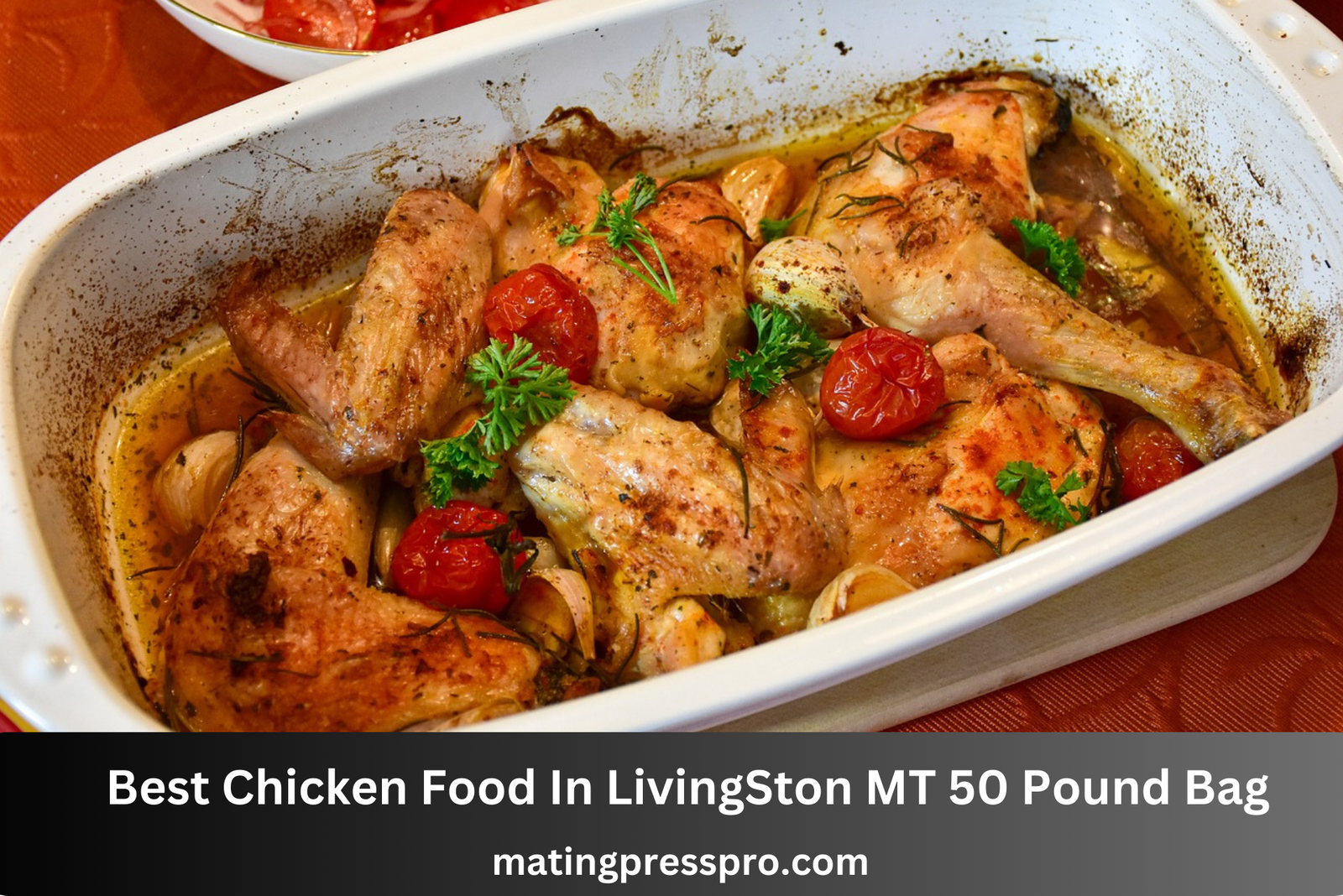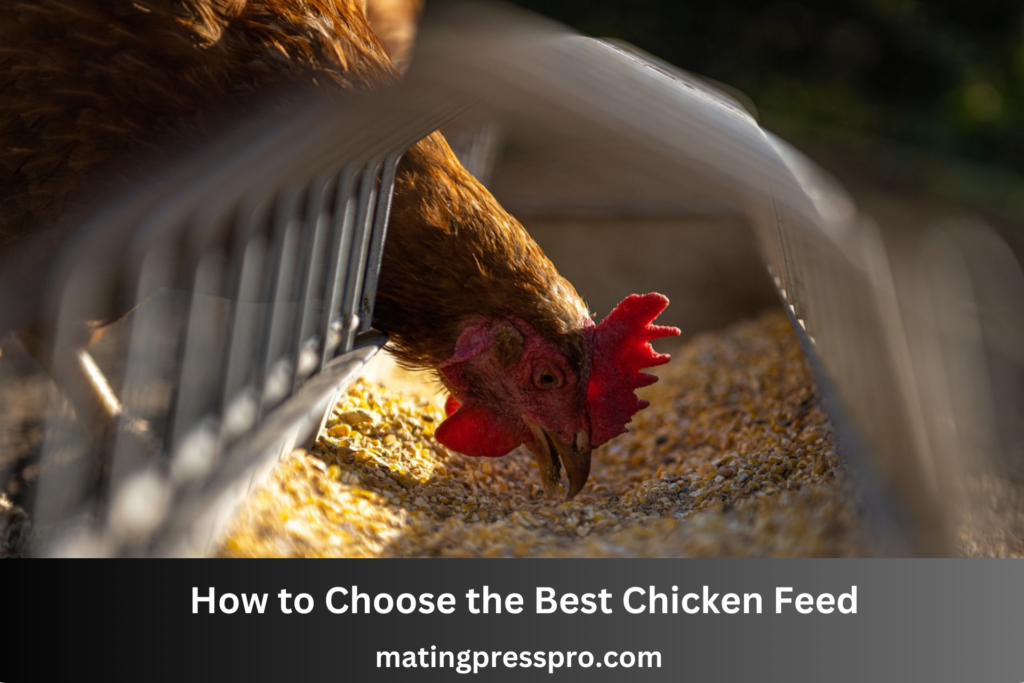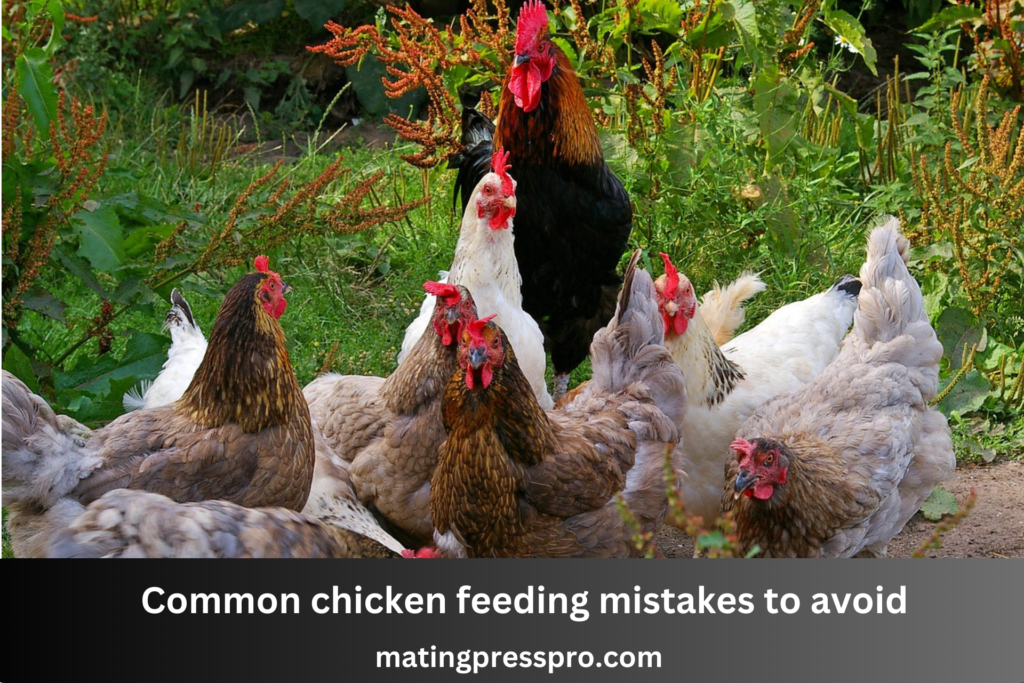Best Chicken Food In LivingSton MT 50 Pound Bag

To keep your flock of chickens healthy and productive, you must feed them well in Livingston, MT. This is THE best chicken food available in 50 pound bags in Livingston, MT – what to look for, where to buy and the nutritional advantages.
Why Quality Chicken Food Matters
A balanced diet is essential for the health of chickens; it contributes to laying nutritious eggs as well as proper growth. Usually, premium quality chicken feeds comprise a mixture of different grains, vitamins and minerals that are uniquely designed for different types of chicken breeds at various growth stages. Your birds will lay more eggs if they are fed on good quality food besides improved meat quality of your chicken among other benefits.
Top Brands of Chicken Food in Livingston, MT
1. Purina Layena Crumbles
Everyone who has been keeping layers knows about this brand called Purina Layena Crumbles. This layer feed is nutritionally balanced and provides all the necessary nutrients that a hen needs to lay quality eggs. In terms of feeding many hens at once it offers a cost-effective option.
- Nutritional Benefits: Strong eggshells due to high calcium levels plus digestive health from prebiotics and probiotics
- Where to Buy: They can be found in local shops dealing with animal feeds or online stores.
- Ingredients: Ground corn, soybean meal, calcium carbonate and combination of minerals and vitamins
- Feeding Instructions: Oyster shell or grit should be added when needed; always provide fresh feed at all times.
2. Dumor Poultry Grower
Raising young chickens? Dumor Poultry Grower supplies everything they need for growth & development without leaving any room for nutrient deficiencies. Apart from its affordability aspect this type is also very rich in nutrients hence popular within Livingston region.
- Nutritional Benefits: Rapid growth supported by proteins & key vitamins
- Where to Buy: Supplied by Tractor Supply Co. among other local retailers.
- Ingredients: Ground corn, soybean meal, fish meal and essential vitamins and minerals
- Feeding Instructions: When chicks hatch up to 8 weeks old followed by switching to a layer feed.
3. Nature’s Best Organic Feeds
For those who want organic products, then Nature’s Best Organic Feeds is the best option available out there. This organic chicken feed is non-GMO so your flock is fed without any artificial substances.
- Nutritional Benefits: Certified organic, non-GMO and devoid of synthetic additives
- Where to Buy: It can be purchased from health food stores and some specialty online shops.
- Ingredients: Organically grown corn, organically grown soybean meal and mixture of minerals & vitamins (organically produced).
- Feeding Instructions: Adjust feeding amounts based on chicken ages or size at all life stages.
Nutritional Components of Quality Chicken Feed
Understanding the nutritional composition of some chicken feeds will help you make an informed decision on a suitable dietary supplement for them. However the following are some key nutrients available in quality feeds that can be used for chicken:
Protein
Muscle development as well as other forms of growth are dependent upon protein which is very critical in chickens. Protein content should be well balanced depending on the various brooding ages such as from inception to when they become adult hens since this makes them grow faster in their lives. Growing layers require more protein than mature ones.
Calcium
Calcium is necessary for laying hens so that they can produce healthy eggshells. Therefore calcium rich feeds prevent problems like soft shelled or brittle eggs resulting from low levels of calcium supply while promoting bone strength in chickens generally.
Vitamins and Minerals
To boost the immune system, improve feather quality, and support overall health, a good chicken feed will include a mix of vitamins and minerals. Some crucial vitamins are A, D, E while phosphorous and potassium are among some important minerals.
Probiotics and Prebiotics
Improving nutrient absorption and supporting digestive health is why many top quality poultry feeds include probiotics and prebiotics in their formulation. This helps to maintain a healthy gut flora hence reducing the risk of digestion-related problems as well as improving overall health.
How to Choose the Best Chicken Feed

Use air-tight containers
Rodents and pests cannot contaminate feed when airtight containers are used. Tight-fitting lids on metal or heavy-duty plastic bins are recommended for this purpose.
Store in a cool place
Because heat destroys the nutritional value of feed, it should be stored in a cool place. Avoid direct sunlight and excess heat sources.
Rotate stock
To ensure freshness, use the oldest feed first. Label containers with date of purchase to keep track of stock.
Feeding tips for healthy chickens
In addition to choosing the right feed, it is important that you practice proper feeding habits with your flock.
Consistent feeding schedule
Make sure you maintain a consistent feeding schedule. Chickens love routine and regularly giving them food at these times would improve their health and production ability.
Supplemental Feeding
You can supplement their diet with kitchen scraps, greens like cabbages as well as occasional treats. These can help provide additional nutrients and keep your birds busy. read all related post here.
Clean Water Supply
Always make sure that your chickens have access to clean water. Proper hydration is vital both for digestion and general health.
Common chicken feeding mistakes to avoid

Even experienced poultry producers might make mistakes when it comes to feeding their birds Here are some common ones:
Overfeeding
For instance, overfeeding may cause obesity thus lead to other problems associated with it in poultry farming. Follow given instructions about feeds’ quantities required by each age or size category of hens in your farm
Underfeeding
Malnutrition due lack of enough feeds may lead poor egg laying; chicks will grow slowly as they die out as young chicks. Make sure there’s enough feed according to what each animal needs nutritionally.”
Inconsistent Feeding
Changing chicken’s eating schedules frequently stresses them hence lowers productivity levels among them”. Therefore always stick to one routine.
Ignoring Nutritional Needs
Every type, breed or stage of life requires a particular diet. These are the issues your thinking should be based on:
Frequently asked questions
What is the best broiler chicken feed?
Broilers require high proteins feeds to promote their accelerated growth; thus good food for them would contain protein as its main component.
Dumor Poultry Grower is an outstandingly excellent food meant for broilers since it contains necessary nutrients which bring about health and efficient putting on of weight.
How to make cheap chicken food?
Making own poultry feeds can save you money. Mix corn and wheat with soybean meal as a protein source then add vitamins and minerals for balance. Here’s what you’ll need:
- Ingredients:
- 40% maize
- 20% wheat
- 20% soya bean meal
- 10% oats
- -5% fishmeal
- -5 % premix
Instructions:
- Mix all ingredients together well.
- Place in an air-tight container.
- Use as required but always keep fresh water available.
Advanced Feeding Strategies
Some advanced feeding techniques may help improve your chickens’ wellbeing and productivity.
Fermented Feed
Feed fermenting can enhance digestibility and nutrient absorption of chicken feed. You first have to ferment the feed as follows;
- Mix chicken feed with water at a ratio of one part each
- Allow it to sit for up to two days while stirring occasionally.
- Feed fermented mixtures of that kind only to your birds
Sprouted Grains
Increasing the nutritional value by sprouting grains before they are fed to chickens is possible so how?
Soak grains in water for twenty-four hours, then rinse and drain daily until they sprout. This will take about two to three days.
Seasonal Feeding Considerations
Consider altering your flock’s diet based on the seasons so they get the right nutrients all year.
Winter
In winter, chickens need to consume more energy so as to keep themselves warm. Slightly increase feed rations and include high-energy snacks such as cracked corn.
Summer
Watering and cooling should be prioritized in summer. Always ensure that fresh water is available and provide them with watery delicacies like water melon and cucumber.
How to Transition Between Different Feeds
Gradual transitioning between different feeds will avoid gastrointestinal upsets in your chicken.
- Start by mixing a new ration of 25:75 in favor of old feed.
- Increasingly add the new feed over a period of 7-10 days.
- Observe if any signs of digestive disorders appear among hens then, if necessary, modify transition period for them.
The Environmental Impact of Chicken Feed Choices
Choosing chicken feeds that are sustainable and environmentally friendly can reduce your farms ecological footprint
Organic and Non-GMO Options
Organic and non-GM feeds do not have synthetic chemicals or genetically modified organisms hence they are more sustainable alternatives.
Local Sourcing
Getting locally produced feed reduces transportation emissions while supporting local economies.
Choosing The Right Chicken Food
Feeding your chickens correctly is highly important for their well-being and productivity. Therefore, you should pay attention to what they eat by taking into account their special nutritional requirements as well as purchasing top quality products from reliable suppliers. By doing this you can make sure that your birds stay healthy enough to give you the desired amount of eggs every day. At Livingston, Montana where you can buy Nature’s Best (organic) or Purina Layena Crumbles (conventional), there is no shortage of great options for poultry farmers
Maintain good feeding practices when it comes to storage of feeds. Practices that could help make your chickens healthier and more productive include fermented feed and seasonal changes. These methods will help in environmental conservation as far as the type of feeds you choose are concerned.
Understanding Chicken Nutritional Needs
Before selecting the best chicken food, it’s important to understand the basic nutritional requirements of chickens. Chickens need a balanced diet that includes:
- Proteins: Essential for growth, egg production, and overall health.
- Carbohydrates: Provide energy for daily activities.
- Vitamins and Minerals: Important for metabolic functions and maintaining strong bones.
- Fats: Offer a concentrated source of energy.
Types of Chicken Feed
When selecting chicken feed, you will encounter several types, each formulated for different life stages and purposes. Here are the primary categories:
- Starter Feed
Designed for chicks, this feed is high in protein (typically around 20-24%) to support rapid growth. - Grower Feed
This feed is suitable for pullets and younger chickens, offering moderate protein (about 16-20%) as they transition from chicks to adults. - Layer Feed
Specifically formulated for hens that are laying eggs, layer feed contains around 16% protein and added calcium to support eggshell formation. - Finisher Feed
For meat chickens, finisher feed is designed to maximize weight gain before processing, generally containing higher protein levels (up to 22%).
Top Chicken Food Brands in Livingston, MT
Several reputable brands provide high-quality chicken feed in 50-pound bags in Livingston. Here are our top picks:
1. Purina Layena
Purina Layena is a popular choice among chicken owners, offering a complete layer feed designed to meet the nutritional needs of laying hens. It is rich in protein and calcium, ensuring healthy egg production. Additionally, it contains prebiotics and probiotics for improved digestion.
2. Nutrena NatureWise
Nutrena’s NatureWise line provides high-quality poultry feed with a focus on natural ingredients. Their layer feed offers a balanced diet and is enriched with essential vitamins and minerals to promote overall health.
3. Dumor Chicken Feed
Dumor is known for its affordable and reliable chicken feed. Their layer feed and grower formulas contain essential nutrients to support growth and egg production. Dumor products are readily available at local feed stores in Livingston.
4. Kalmbach Feeds
Kalmbach Feeds offers premium chicken feed made with high-quality ingredients. Their feeds are free from antibiotics and contain no artificial preservatives. They also provide specific formulations for various life stages.
Benefits of Buying 50-Pound Bags
Purchasing 50-pound bags of chicken feed has several advantages:
- Cost-Effective: Buying in bulk often reduces the price per pound, saving you money in the long run.
- Convenience: Large bags ensure that you have enough feed on hand for your flock without needing to make frequent trips to the store.
- Freshness: Many suppliers provide newly milled feeds in large bags, ensuring you receive fresh and nutrient-rich food for your chickens.
Storage Tips for Chicken Feed
To maintain the quality and freshness of your chicken feed, proper storage is crucial. Here are some tips:
- Cool, Dry Place: Store feed in a cool, dry location to prevent mold and spoilage.
- Air-Tight Containers: Use air-tight containers to keep out moisture and pests. A metal bin or a heavy-duty plastic container works well.
- Labeling: Always label your containers with the purchase date to keep track of freshness.
Additional Nutritional Supplements
While a good chicken feed provides a solid nutritional foundation, some supplements can further enhance your flock’s health:
- Calcium Supplements: Essential for laying hens to produce strong eggshells.
- Grit: Helps with digestion, particularly for chickens that forage.
- Probiotics: Supports gut health and enhances nutrient absorption.
Best Practices for Feeding Chickens
When raising chickens, it’s crucial to provide a balanced diet tailored to their specific needs. A balanced chicken feed not only supports growth and egg production but also enhances the overall health and immunity of your flock. Consider these best practices for feeding your chickens:
1. Fresh Water Availability
Water is just as vital as feed. Chickens need access to fresh, clean water at all times, as it aids in digestion and nutrient absorption. In hot weather, check their water supply frequently to ensure they remain hydrated.
2. Transitioning Feed Gradually
If you’re switching between different types of feed (e.g., from grower to layer feed), do so gradually. Sudden changes in diet can upset their digestive systems. Start by mixing the new feed with the old, gradually increasing the ratio of the new feed over a week.
3. Monitoring Body Condition
Keep an eye on your chickens’ body condition. A healthy chicken should have a well-rounded body without being overly fat or too thin. Adjust feed quantities as needed to maintain optimal body condition and egg production.
4. Foraging Opportunities
Chickens love to forage! Allowing them to roam in a safe area can enhance their diet with natural greens, insects, and seeds. This not only provides additional nutrition but also encourages natural behaviors, leading to happier, healthier chickens.
5. Regular Health Checks
In addition to a proper diet, regularly check your chickens for signs of illness or distress. Look for changes in behavior, feather condition, and egg production. Early detection of health issues can make a significant difference in treatment outcomes.
By following these feeding practices and ensuring your chickens receive the proper nutrition, you’ll help them thrive in Livingston’s unique environment. Providing a wholesome diet and ample care will lead to a productive and happy flock.
FAQs About Best Chicken Food In LivingSton MT 50 Pound Bag
1. What is the best chicken food for laying hens in Livingston, MT?
The best chicken food for laying hens typically contains around 16% protein and additional calcium for eggshell strength. Brands like Purina Layena and Nutrena NatureWise are popular choices in Livingston.
2. How much chicken feed should I give my flock daily?
The general rule of thumb is to provide about 1/4 to 1/3 pound of feed per chicken per day. Adjust this amount based on your flock’s size, age, and activity level.
3. Can I feed my chickens kitchen scraps?
Yes, chickens can eat certain kitchen scraps, such as fruits, vegetables, and grains. However, avoid feeding them citrus fruits, onions, garlic, and any moldy or spoiled food, as these can be harmful.
4. How do I store chicken feed to keep it fresh?
Store chicken feed in a cool, dry place, ideally in air-tight containers. This helps prevent moisture, pests, and spoilage, ensuring the feed remains fresh and nutritious.
5. What is the difference between starter, grower, and layer feed?
Starter Feed: High in protein (20-24%) for chicks.
Grower Feed: Moderate protein (16-20%) for pullets transitioning to adults.
Layer Feed: Formulated for laying hens with around 16% protein and added calcium.
6. Are there any organic chicken feed options available?
Yes, several brands offer organic chicken feed made from natural ingredients without synthetic additives. Look for products labeled as organic at your local feed store.
7. How often should I change the feed?
Check the expiration date on your chicken feed bags and aim to use them within 6 months of purchase. Regularly assess the feed for freshness and discard any that appears moldy or has an off smell.
Conclusion; Best Chicken Food In LivingSton MT 50 Pound Bag
Choosing the best chicken food in Livingston, MT, involves understanding the nutritional needs of your flock and selecting high-quality products available in 50-pound bags. Brands like Purina Layena, Nutrena NatureWise, Dumor, and Kalmbach Feeds offer excellent options tailored to different stages of chicken development.
By investing in proper chicken feed, you ensure your birds are healthy and productive, leading to abundant egg production and robust growth. Remember to store feed properly and consider nutritional supplements to maximize your flock’s potential.






